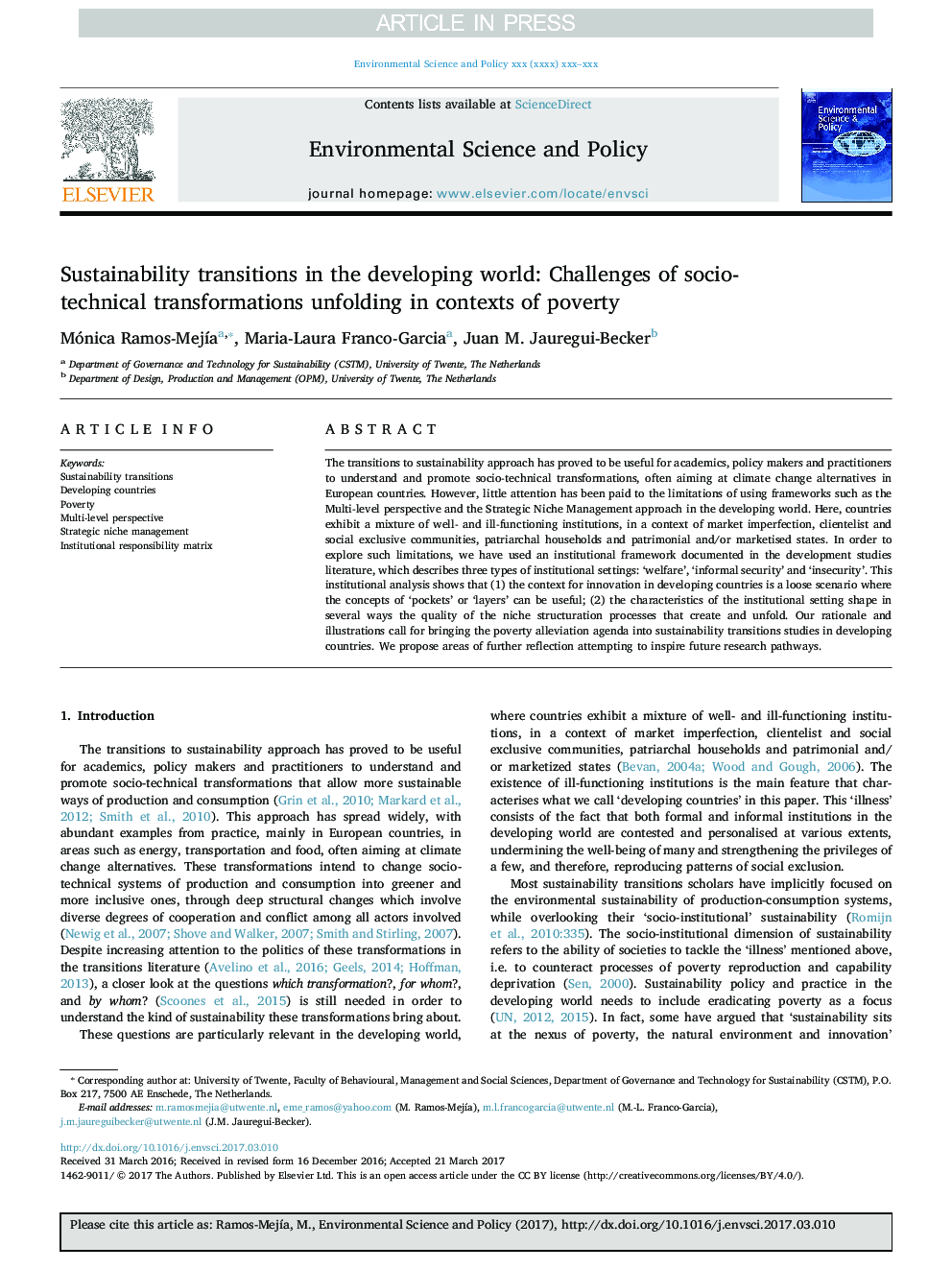| کد مقاله | کد نشریه | سال انتشار | مقاله انگلیسی | نسخه تمام متن |
|---|---|---|---|---|
| 7465996 | 1485024 | 2018 | 7 صفحه PDF | دانلود رایگان |
عنوان انگلیسی مقاله ISI
Sustainability transitions in the developing world: Challenges of socio-technical transformations unfolding in contexts of poverty
ترجمه فارسی عنوان
انتقال های پایدار در کشورهای در حال توسعه: چالش های تحولات اجتماعی و فنی در زمینه های فقر
دانلود مقاله + سفارش ترجمه
دانلود مقاله ISI انگلیسی
رایگان برای ایرانیان
کلمات کلیدی
انتقال پایدار، کشورهای در حال توسعه، فقر، چشم انداز چند مرحله ای، مدیریت توزیع استراتژیک، ماتریس مسئولیت نهادی،
ترجمه چکیده
انتقال به رویکرد پایداری برای دانشگاهیان، سیاستگذاران و تمرینکنندگان برای درک و تحکیم تحولات اجتماعی و فنی، اغلب با هدف جایگزینی تغییرات اقلیمی در کشورهای اروپایی مفید است. با این وجود توجه محدودی به محدودیت های استفاده از چارچوب هایی نظیر دیدگاه چند سطحی و رویکرد مدیریت استراتژیک در جهان در حال توسعه صورت گرفته است. در اینجا کشورهای مخلوطی از نهادهای خوب و ناکارآمد را در یک زمینه ناقض بازار، جوامع منحصر به فرد و جوامع انسانی، خانواده های پدرسالارانه و دولتهای حاکم و / یا بازار آزاد نشان می دهند. به منظور بررسی چنین محدودیت ها، ما از یک چارچوب نهادی که در ادبیات مطالعات توسعه، که در آن سه نوع تنظیمات نهادی را توصیف می کند، شرح داده شده است: «رفاه»، «امنیت غیررسمی» و «ناامنی». این تجزیه و تحلیل نهادی نشان می دهد که (1) زمینه نوآوری در کشورهای در حال توسعه یک سناریوی آزاد است که مفاهیم "جیب" یا "لایه ها" می تواند مفید باشد؛ (2) ویژگی های ساختار سازمانی به روش های مختلفی از کیفیت فرایندهای ساختاری طاقچه ای که ایجاد و گسترش می یابد شکل می گیرد. منطق و تصاویر ما، خواستار آوردن دستور کار کاهش فقر در مطالعات انتقال پایداری در کشورهای در حال توسعه است. ما زمینه هایی را برای انعکاس بیشتر تلاش می کنیم تا الهام بخش مسیرهای تحقیق آینده شوند.
موضوعات مرتبط
مهندسی و علوم پایه
مهندسی انرژی
انرژی های تجدید پذیر، توسعه پایدار و محیط زیست
چکیده انگلیسی
The transitions to sustainability approach has proved to be useful for academics, policy makers and practitioners to understand and promote socio-technical transformations, often aiming at climate change alternatives in European countries. However, little attention has been paid to the limitations of using frameworks such as the Multi-level perspective and the Strategic Niche Management approach in the developing world. Here, countries exhibit a mixture of well- and ill-functioning institutions, in a context of market imperfection, clientelist and social exclusive communities, patriarchal households and patrimonial and/or marketised states. In order to explore such limitations, we have used an institutional framework documented in the development studies literature, which describes three types of institutional settings: 'welfare', 'informal security' and 'insecurity'. This institutional analysis shows that (1) the context for innovation in developing countries is a loose scenario where the concepts of 'pockets' or 'layers' can be useful; (2) the characteristics of the institutional setting shape in several ways the quality of the niche structuration processes that create and unfold. Our rationale and illustrations call for bringing the poverty alleviation agenda into sustainability transitions studies in developing countries. We propose areas of further reflection attempting to inspire future research pathways.
ناشر
Database: Elsevier - ScienceDirect (ساینس دایرکت)
Journal: Environmental Science & Policy - Volume 84, June 2018, Pages 217-223
Journal: Environmental Science & Policy - Volume 84, June 2018, Pages 217-223
نویسندگان
Mónica Ramos-MejÃa, Maria-Laura Franco-Garcia, Juan M. Jauregui-Becker,
